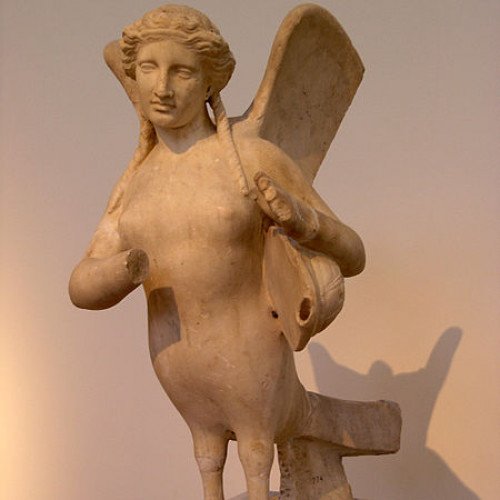Alkonost VS Siren (mythology)

Alkonost
The Alkonost is, according to Russian mythos and folklore, a woman-headed bird. It makes amazingly beautiful sounds, and those who hear these sounds forget everything they know and want nothing more ever again. She lives in the underworld with her counterpart, the Sirin. The Alkonost lays her eggs on a beach and then rolls them into the sea. When the Alkonost's eggs hatch, a thunderstorm sets in and the sea becomes so rough that it becomes impossible to traverse. She is also the sister of other birds from Slavic mythology, such as Rarog and Stratim.According to folk tales, at the morning of the Apple Feast of the Saviour day, Sirin flies into the apple orchard and cries sadly. In the afternoon, the Alkonost flies to this place, beginning to rejoice and laugh. Alkonost brushes dew from her wings, granting healing powers to all fruits on the tree she is sitting on.The name of the Alkonost came from a Greek demigoddess whose name was Alcyone. In Greek mythology, Alcyone was transformed by the gods into a kingfisher.Alkonost is more likely an individual character, as was noted in some legends about this bird.
Statistics for this Xoptio

Siren (mythology)
In Greek mythology, the Sirens (Greek singular: Σειρήν, Seirḗn; Greek plural: Σειρῆνες, Seirênes) were dangerous creatures, who lured nearby sailors with their enchanting music and singing voices to shipwreck on the rocky coast of their island. Roman poets placed them on some small islands called Sirenum scopuli. In some later, rationalized traditions, the literal geography of the "flowery" island of Anthemoessa, or Anthemusa, is fixed: sometimes on Cape Pelorum and at others in the islands known as the Sirenuse, near Paestum, or in Capreae. All such locations were surrounded by cliffs and rocks. According to the Greek Neoplatonist philosopher Proclus, Plato said there were three kinds of Sirens: the celestial, the generative, and the purificatory / cathartic. The first were under the government of Zeus, the second under that of Poseidon, and the third of Hades. When the soul is in heaven the Sirens seek, by harmonic motion, to unite it to the divine life of the celestial host; and when in Hades, to conform the soul to eternal infernal regimen; but when on earth their only job to "produce generation, of which the sea is emblematic".